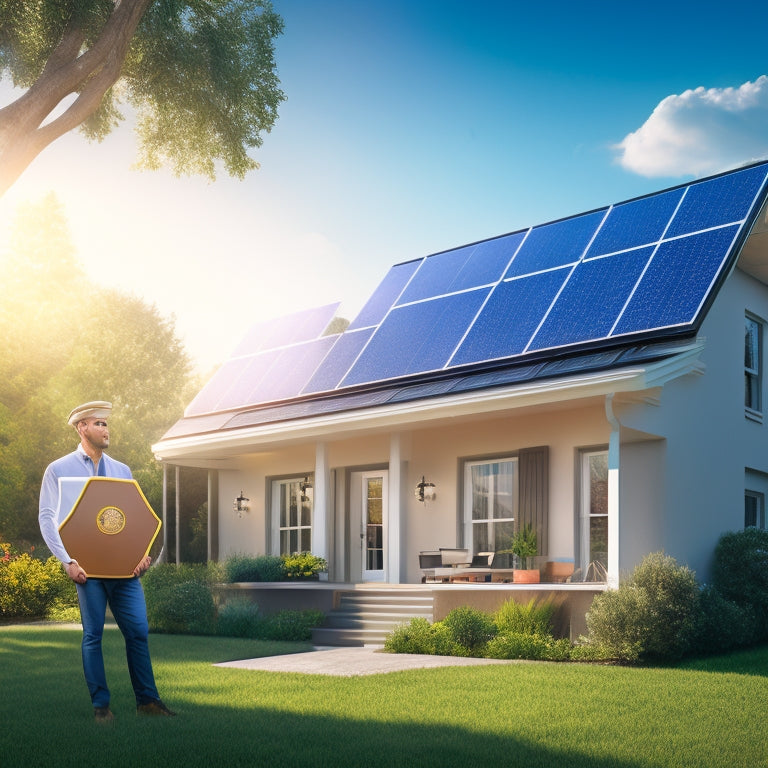
Buying Solar Panels With Warranty: a Step-By-Step Guide
Share
As you prepare to invest in solar panels, ensuring a thorough warranty is essential, as it directly impacts the overall value and performance of your system, covering defects, malfunctions, and degradation, while also providing clear expectations on coverage and duration. To make an informed decision, you'll want to understand the nuances of warranties, choose the right panel for your needs, research the manufacturer's reputation, and review warranty terms and conditions. By following these steps, you'll be well-equipped to navigate the process and find the best warranty for your solar panel system, and discovering the intricacies of each step will reveal the full picture.
Key Takeaways
• Thoroughly research the manufacturer's reputation, certifications, and warranty terms to ensure a comprehensive warranty that covers defects, malfunctions, and degradation.
• Verify the warranty coverage period, which can range from 10 to 30 years, and understand what is included and excluded from the coverage.
• Evaluate the system performance guarantees, including the minimum guaranteed output percentage, efficiency ratios, and expected degradation rate over time.
• Assess the quality of customer support, including response times, online reviews, and support channels, to ensure timely and effective assistance.
• Purchase from authorized dealers to ensure genuine products, expert advice, and proper warranty registration, and verify the warranty registration process to guarantee warranty activation and eligibility for claims.
Understanding Solar Panel Warranties
When buying solar panels, you need to understand the warranty that comes with your purchase, as it can greatly impact the overall value and performance of your solar panel system. A thorough warranty provides protection against defects, malfunctions, and degradation, ensuring your investment yields the expected returns. You should have clear warranty expectations, knowing exactly what's covered and for how long.
Warranty clauses outline the terms and conditions, including the duration, scope, and process for filing claims. Be aware of the warranty's length, typically ranging from 10 to 30 years, and the type of coverage provided. Some warranties may cover only the panel itself, while others may include inverters, mounting systems, and other components.
Understand the performance guarantees, specifying the minimum power output over time. Be cautious of warranties with vague language, as they may leave you exposed to costly repairs or replacements. By grasping the intricacies of your solar panel warranty, you can make an informed purchase, minimizing potential risks and ensuring a hassle-free experience.
Choosing the Right Solar Panel
Your solar panel selection significantly influences the performance and longevity of your system, so it's crucial to choose the right one for your specific needs and environment.
When selecting a solar panel, consider factors such as Panel Efficiency, which measures how well the panel converts sunlight into electricity. Higher-efficiency panels produce more power per unit area, making them ideal for small or complex rooftops.
You'll also want to guarantee System Compatibility by checking the panel's voltage, current, and connector type. This ensures seamless integration with your inverter, mounting system, and other components.
Additionally, consider the panel's durability, temperature coefficient, and low-light performance to ensure efficient energy production in various weather conditions.
Lastly, assess the panel's certifications, such as UL (Underwriters Laboratories) or IEC (International Electrotechnical Commission), which guarantee compliance with industry standards.
Researching Manufacturer Reputation
When researching a manufacturer's reputation, you'll want to scrutinize their history, looking for signs of stability and longevity.
You should also verify their industry certifications, ensuring they meet rigorous standards for quality and performance.
Additionally, pay attention to their transparency standards, as a reputable manufacturer will openly share information about their products and business practices.
Manufacturer's History
Researching a manufacturer's reputation involves scrutinizing their history, including the number of years they've been in business, to guarantee you're investing in a company that will be around to honor their warranty commitments. You want to make certain that the manufacturer has a proven track record of delivering quality products and standing behind their warranties.
When researching a manufacturer's history, you'll want to look for company milestones, such as the year they were founded, significant product releases, and notable partnerships. A company's founding story can also provide valuable insight into their values and mission.
For instance, did they start as a small startup with a passion for renewable energy, or did they evolve from a traditional energy company? Understanding the company's history and values can help you determine if they're a good fit for your solar panel needs.
Industry Certifications
Beyond a manufacturer's history, third-party certifications can provide additional assurance of a company's dedication to quality and reliability, as they indicate compliance with industry-recognized standards for solar panel performance, safety, and environmental responsibility.
When researching a manufacturer's reputation, you should look for industry certifications that demonstrate their commitment to quality and reliability. A key certification to look for is UL Certification, which guarantees that the solar panels meet safety standards for electrical Shock, Fire, and casualty hazards. Additionally, ISO Compliance is essential, as it confirms that the manufacturer follows a quality management system that meets international standards.
You should also verify if the manufacturer's certification is up-to-date and valid. By checking for these certifications, you can be confident that the solar panels you purchase meet industry standards for performance, safety, and environmental responsibility.
Transparency Standards
You can gauge a manufacturer's commitment to transparency by reviewing their warranty terms, documentation, and customer support, as clear and concise communication is essential in building trust with customers.
A reputable manufacturer will have transparent disclosure protocols in place, providing easy access to information about their products and warranties. This includes clear product specifications, performance data, and warranty terms that outline what's covered and for how long.
When researching a manufacturer's reputation, look for evidence of regulatory oversight, such as compliance certifications from reputable organizations. This confirms that the manufacturer is held to high standards of quality and accountability.
Additionally, check for third-party validation, such as ratings from independent testing labs or industry associations. A manufacturer that operates with transparency will have nothing to hide, and you'll be more confident in your purchasing decision.
Checking Warranty Terms and Conditions
Thoroughly reviewing the warranty terms and conditions is vital, as it determines the level of protection and support you can expect from the manufacturer in case your solar panels malfunction or underperform.
When scrutinizing the warranty, pay close attention to the fine print, where manufacturers often hide warranty loopholes. These loopholes can greatly limit your protection, so it's important to identify them.
For instance, some warranties may only cover specific components or have strict maintenance requirements. You must understand these contract nuances to make sure you're not caught off guard in case of a problem.
Be wary of vague language, ambiguous definitions, or overly broad disclaimers that can render the warranty useless.
Evaluating System Performance Guarantees
When evaluating system performance guarantees, you'll want to examine the metrics used to measure system performance, such as capacity, efficiency, and energy output.
You should also determine the warranty coverage periods for these guarantees, which may vary depending on the manufacturer.
System Performance Metrics
Evaluating system performance guarantees involves evaluating the manufacturer's promises regarding the solar panel system's energy output, typically measured in kilowatt-hours (kWh) per year. As you assess these guarantees, you'll want to examine the system performance metrics that guarantee you get the energy output you expect.
Here are some key metrics to take into account:
-
Efficiency Ratios: Look for the manufacturer's promised efficiency ratio, which compares the system's actual energy output to its theoretical maximum output.
-
Performance Benchmarks: Check if the manufacturer provides specific performance benchmarks, such as the system's expected energy output during peak sun hours.
-
Annual Energy Output: Review the manufacturer's guarantees for annual energy output, typically measured in kWh per year.
- Degradation Rate: Understand the expected degradation rate of the solar panels over time, which affects the system's overall energy output.
Warranty Coverage Periods
You'll want to scrutinize the warranty coverage periods that guarantee the system's performance over time, as they vary greatly between manufacturers. These periods typically range from 10 to 30 years, with some manufacturers offering extended coverage options. When evaluating warranty coverage periods, it's crucial to understand what's included and what's excluded. Warranty exclusions may include damage caused by natural disasters, improper installation, or maintenance neglect. Be sure to review the warranty document carefully to avoid any surprises down the line.
Some manufacturers offer extended coverage options, which can provide additional peace of mind. These extended warranties may cover components, labor, or both, and can be purchased separately or bundled with the initial system cost. When considering extended coverage, weigh the additional cost against the potential benefits of extended protection.
A thorough warranty with extended coverage can provide long-term security and minimize potential risks associated with system performance. By carefully evaluating warranty coverage periods and exclusions, you can make an informed decision that meets your energy needs and budget.
Energy Output Guarantees
Your solar panel system's performance guarantee, typically measured by its energy output, serves as a critical indicator of its overall effectiveness, with manufacturers usually providing a minimum guaranteed output percentage over a specified period.
When evaluating system performance guarantees, consider the following key factors:
-
Output degradation rate: Look for a slow degradation rate to guarantee consistent energy production over time.
-
Power fluctuations: Check if the manufacturer assures a stable output despite weather conditions, such as cloud cover or extreme temperatures.
-
Weather resistance: Make sure the system is designed to withstand various environmental conditions, including hurricanes, hail, and snow loads.
- Performance monitoring: Verify if the manufacturer provides real-time monitoring and reporting to help you track your system's energy output.
Assessing Customer Support Quality
When shopping for solar panels, scrutinize the manufacturer's customer support quality by reviewing their warranty terms, response times, and overall reputation. You want to make sure that the company will be there for you if any issues arise. Check online Customer Reviews to get a sense of the manufacturer's responsiveness and willingness to resolve problems. Look for reviews that mention customer support, and pay attention to any red flags.
Also, investigate the manufacturer's Support Channels. Are they available through multiple channels, such as phone, email, and online chat? How quickly do they respond to inquiries? A manufacturer with a strong customer support system in place can save you time and hassle in the long run.
Here's a sample comparison of customer support quality among different manufacturers:
| Manufacturer | Customer Review Rating | Response Time | Support Channels |
|---|---|---|---|
| Manufacturer A | 4.5/5 | < 2 hours | Phone, Email, Chat |
| Manufacturer B | 4.2/5 | < 4 hours | Phone, Email |
| Manufacturer C | 3.8/5 | < 24 hours | Phone, Email |
| Manufacturer D | 4.8/5 | < 1 hour | Phone, Email, Chat, Online Portal |
Comparing Prices and Discounts
Comparing prices and discounts among different manufacturers is crucial, as it can greatly impact your overall cost savings and return on investment. When buying solar panels with a warranty, you want to make sure you're getting the best deal possible.
Here are some key factors to take into account when comparing prices and discounts:
-
Price Variations: Research different manufacturers and compare their prices for similar products. Look for price variations between models, and evaluate the warranty offered with each.
-
Discount Strategies: Identify manufacturers offering discounts, promotions, or bundle deals. Some may offer discounts for bulk purchases or loyalty programs.
-
Warranty Inclusions: Compare the warranty inclusions, such as the length of the warranty, coverage, and maintenance requirements.
- Certifications and Compliance: Verify if the manufacturer's products meet local and national certifications, ensuring compliance with industry standards.
Purchasing From Authorized Dealers
Once you've compared prices and discounts, it's important to verify that you're buying from authorized dealers, as they can provide additional warranty support, genuine products, and proper installation guidance. This is essential because authorized dealers have undergone rigorous training and have direct access to the manufacturer's resources. They can offer you expert advice on system design, installation, and maintenance, ensuring your solar panel system operates at peak efficiency.
When researching authorized dealers, pay attention to their reputation online. Check review websites, social media, and testimonials to get a sense of their sales tactics and customer service. Be wary of dealers with high-pressure sales tactics or those who are pushy about making a sale. A reputable dealer will take the time to answer your questions, provide detailed quotes, and explain the warranty terms. They'll also be transparent about the installation process and provide ongoing support.
Verifying Warranty Registration Process
Your solar panel system's warranty is only as reliable as its registration, so you'll want to make sure the dealer handles the warranty registration process properly, providing you with a unique warranty identification number to verify online. This guarantees that your warranty is valid and that you're eligible for warranty claims in case of any issues.
To verify the warranty registration process, follow these steps:
-
Request a warranty registration confirmation: Ask your dealer to provide a confirmation document or email with your unique warranty identification number.
-
Check the manufacturer's website: Visit the manufacturer's website to confirm your warranty registration using your identification number.
-
Review the registration timeline: Confirm the registration timeline, including the start and end dates of your warranty coverage.
- Validate your warranty: Perform a warranty validation check to confirm your warranty is active and eligible for claims.
Frequently Asked Questions
Can I Transfer My Solar Panel Warranty to a New Owner?
You can transfer your solar panel warranty to a new owner, but it's important to review the warranty terms and obtain the manufacturer's approval; guarantee a seamless transfer by notifying them and providing the new homeowner's information.
Do Solar Panels Have a Separate Warranty for Installation?
You're wondering if solar panels come with a separate warranty for installation. Yes, they do! Typically, manufacturers offer two warranties: one for the panels (20-30 years) and another for the installation process (10-20 years), covering labor costs and ensuring quality assurance in system design.
Are Warranty Claims Typically Handled Quickly and Efficiently?
When filing a warranty claim, you'll likely have important warranty expectations, anticipating a smooth claim process. Typically, manufacturers handle claims efficiently, but it's vital to understand the process and required documentation to guarantee a swift resolution.
Can I Upgrade or Modify My Solar Panel System During Warranty?
You can upgrade or modify your solar panel system during warranty, but it's important to check the warranty terms for system expansion and warranty flexibility to confirm that any changes won't void your warranty coverage.
Will My Warranty Be Voided if I DIY Maintenance or Repairs?
'Did you know 95% of solar panel owners opt for DIY maintenance, risking warranty voidance? Be cautious, as self-reliance risks triggering warranty loopholes; it's essential to understand your warranty terms to avoid costly mistakes, ensuring your investment remains protected.'
Related Posts
-

What's the Best Green Ride for College Budgets?
As a college student on a budget, you're likely looking for an eco-friendly ride that won't break the bank. You've go...
-

Best Vehicle Chargers to Keep You Moving
You're looking for a reliable vehicle charger to keep your devices powered up and stay connected on the go. Solar cha...
-

7 Best Financial Incentives for Residential Homeowners
You're entitled to a range of financial incentives that can help offset the costs of owning a home, from federal tax ...


